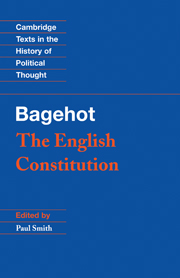Book contents
- Frontmatter
- Contents
- Editor's introduction
- Principal events in Bagehot's life
- Note on the text and annotation
- The English Constitution
- I The Cabinet
- II The Prerequisites of Cabinet Government, and the Peculiar Form Which They Have Assumed in England
- III The Monarchy
- IV The Monarchy (continued)
- V The House of Lords
- VI The House of Commons
- VII On Changes of Ministry
- VIII Its Supposed Checks and Balances
- IX Its History, and the Effects of That History – Conclusion
- Introduction to the Second Edition (1872)
- Biographical notes on persons mentioned in the text
- Bibliographical note
- Index
- Title in the series
VIII - Its Supposed Checks and Balances
Published online by Cambridge University Press: 05 June 2012
- Frontmatter
- Contents
- Editor's introduction
- Principal events in Bagehot's life
- Note on the text and annotation
- The English Constitution
- I The Cabinet
- II The Prerequisites of Cabinet Government, and the Peculiar Form Which They Have Assumed in England
- III The Monarchy
- IV The Monarchy (continued)
- V The House of Lords
- VI The House of Commons
- VII On Changes of Ministry
- VIII Its Supposed Checks and Balances
- IX Its History, and the Effects of That History – Conclusion
- Introduction to the Second Edition (1872)
- Biographical notes on persons mentioned in the text
- Bibliographical note
- Index
- Title in the series
Summary
In a former essay I devoted an elaborate discussion to the comparison of the royal and the unroyal form of parliamentary government. I showed that at the formation of a ministry, and during the continuance of a ministry, a really sagacious monarch might be of rare use. I ascertained that it was a mistake to fancy that at such times a constitutional monarch had no rôle and no duties. But I proved likewise that the temper, the disposition, and the faculties then needful to fit a constitutional monarch for usefulness were very rare, at least as rare as the faculties of a great absolute monarch, and that a common man in that place is apt to do at least as much harm as good – perhaps more harm. But in that essay I could not discuss fully the functions of a king at the conclusion of an administration, for then the most peculiar parts of the English government – the power to dissolve the House of Commons, and the power to create new peers – come into play, and until the nature of the House of Lords and the nature of the House of Commons had been explained, I had no premises for an argument as to the characteristic action of the King upon them. We have since considered the functions of the two Houses, and also the effects of changes of ministry on our administrative system; we are now, therefore, in a position to discuss the functions of a king at the end of an administration.
- Type
- Chapter
- Information
- Bagehot: The English Constitution , pp. 149 - 170Publisher: Cambridge University PressPrint publication year: 2001



